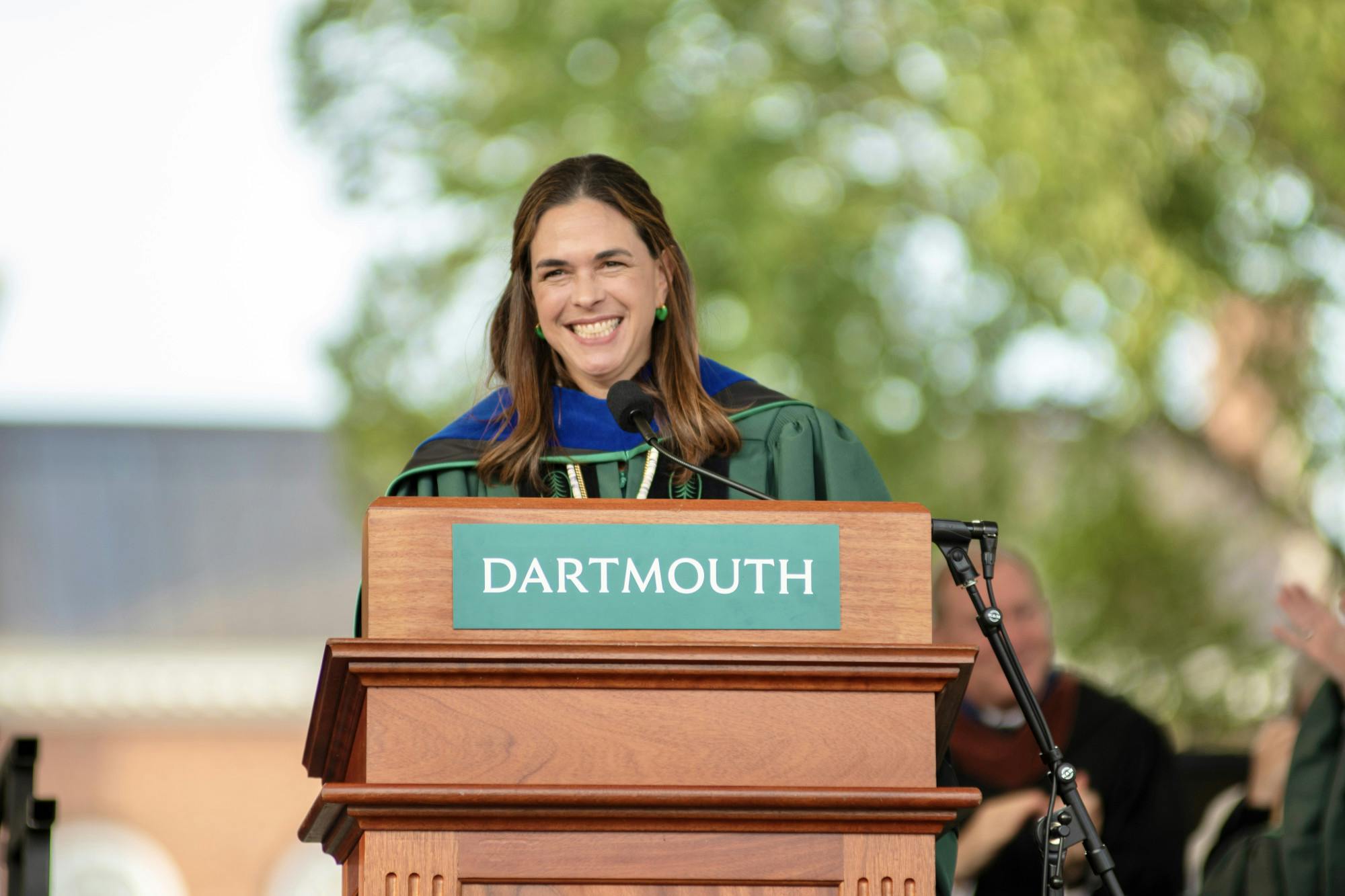Sian Leah Beilock’s inauguration as the first female president of Dartmouth — which comes 51 years after coeducation at the College — has prompted hope among female students and alumna for how her tenure could change the College’s history of sexism.
Viva Hardigg ’84, the first female president of the Dartmouth Outing Club, lived in Wheeler Hall the first term that the dorm was coed. She recalled men filling the stairway to the all-female residence hall when she was coming home, drinking punch from a bag lining a trash barrel and wearing boxer shorts.
“They’re like, ‘You don’t belong here, what are you doing?’” Hardigg said. “I remember planting my skis down, and I’m like, ‘I live here and I’m getting through.’ I walked down to the end of the hall, and I’m resolute, just marching on, and I got in and threw my stuff in the room. I closed the door, and I never locked it before, but I locked it. Then I burst into tears.”
Dartmouth’s misogyny isn’t only a thing of the past, according to Katherine Walker ’26, who said she hoped that Beilock’s presidency could encourage a much-need “cultural shift.”
“I think [President Beilock’s appointment] shows Dartmouth really is committed to changing their legacy of discrimination, misogyny and racism,” Walker said. “We started out really terribly, but we’re trying to change it. I think on some level, it’s nice to know that there’s a woman in charge, when sometimes when I’m at Dartmouth, it feels kind of oppressively white male.”
Walker said she went to Gamma Delta Chi fraternity’s basement once last year and has not returned since, citing “unwanted touching” and “sexual comments.”
“It’s a definite culture … Everyone was in a miniskirt and a really small top, and there were some guys that were looking at me slightly disapprovingly because I wasn’t quite in the uniform,” she said. “This one guy shoves me, and he’s walking with this girl to try to get into the middle of the dance area. So I push him along because he’s being really rude, and he didn’t even look at me.”
According to Walker, the man who pushed her left a bruise, and when she confronted him, he called her “bitch.”
Filmmaker Ricki Stern ’87 cited the fraternity system as a contributor to misogynistic attitudes on campus during her time at Dartmouth.
“They perpetuated the sense that men dominated the space on the campus, because they literally did,” Stern said. “I was in a sorority, and men could enter that space anytime they wanted, they could go down into the basement and drink the beer — it was on tap — do whatever they want. If a woman walked into a fraternity unannounced, uninvited, without a guy chaperoning her, that was just unheard of.”
She also said fraternities were a site of sexual assault. Stern and other women on campus presented these issues to the Board of Trustees in an effort to bring a Women’s Resource Center to campus. Stern said she remembers a member of the all-white, all-male Board of Trustees asking them, “Why do women need a space?”
Despite recalling Dartmouth’s complicated history with coeducation and acknowledging that sexism exists today, many women said that they had high expectations for how a female leader might impact the College.
Janessa Yan ’26, who also noted the complexities of being a woman at Dartmouth, attended Beilock’s Sept. 22 inauguration ceremony. She said it instilled new aspirations in her for the College.
“The women at this school every year continue to have to carve out spaces because sometimes it can feel like it’s like an all boys school that women were just let into,” Yan said. “I’m not sure how different Dartmouth will be, only time can tell. But I appreciate [Beilock’s] attitude, and that she’s bringing a very empathetic, humanistic hand to her work.”
Hardigg attended the inauguration “out of respect,” and said she was encouraged by Beilock’s discussion of sustainability initiatives, improving the relationship between the College and the Hanover community and students’ mental wellbeing.
“I think it’s a really wonderful new beginning,” Hardigg said. “I thought her speech was great. I liked the fact that she mentioned mental health. That is of such importance — if you don’t have that, what do you have? I really liked the fact that she knows, through research, that in order to learn and absorb things academically, the healthy mind is much more receptive,” she said.
Stern said that while she takes issue with gender being framed as the sole evidence of progress, whatever being a woman means to Beilock will contribute to the experience she brings to the position.
“People ask me, ‘What is it like to be a woman filmmaker?’ And I’m like, ‘I don’t know,’ because I’m just a filmmaker, and I’m a woman,” Stern said. “I think if she is the best person for this job — and she clearly is more than capable and will bring a lot to the College — then that’s fantastic.”
The overwhelming feeling was one of hope for what Beilock’s presidency can mean for the College.
“I think Dartmouth is an amazing place, it truly is,” Stern said. “It’s unique and special, and it offers what a lot of other places don’t in terms of being central for community, outdoors activities, the sense of being away from everything can be ultimately very creative and liberating … I think Dartmouth hopefully will be on this path to making some change.”




